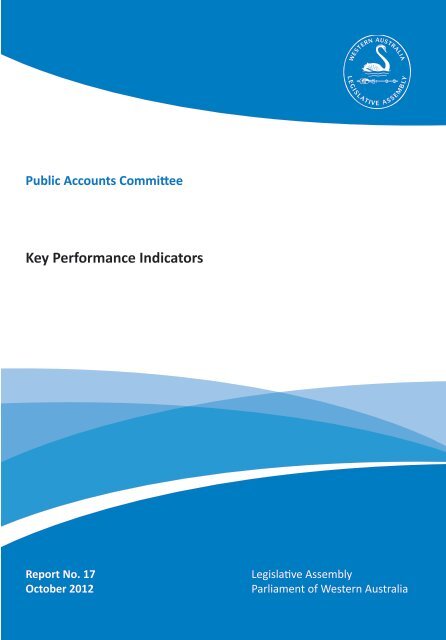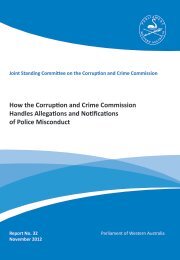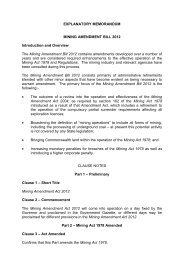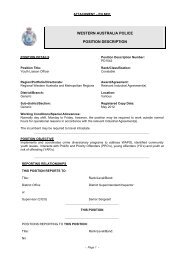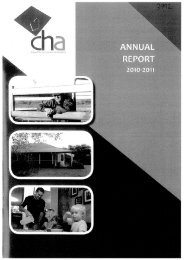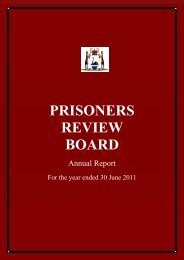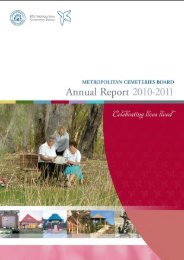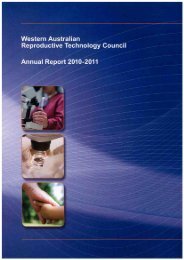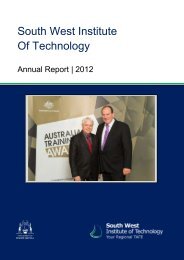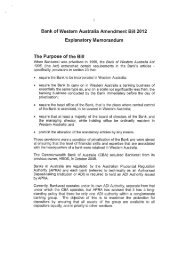Key Performance Indicators - Parliament of Western Australia
Key Performance Indicators - Parliament of Western Australia
Key Performance Indicators - Parliament of Western Australia
Create successful ePaper yourself
Turn your PDF publications into a flip-book with our unique Google optimized e-Paper software.
Public Accounts Committee<br />
<strong>Key</strong> <strong>Performance</strong> <strong>Indicators</strong><br />
Report No. 17<br />
October 2012<br />
Legislative Assembly<br />
<strong>Parliament</strong> <strong>of</strong> <strong>Western</strong> <strong>Australia</strong>
Committee Members<br />
Chair<br />
Deputy Chair<br />
Members<br />
Hon. John Kobelke, MLA<br />
Member for Balcatta<br />
Mr Tony Kristevic, MLA<br />
Member for Carine<br />
Hon. Dr Elizabeth Constable, MLA<br />
Member for Churchlands<br />
Ms Rita Saffioti, MLA<br />
Member for West Swan<br />
Mr Chris Tallentire, MLA<br />
Member for Gosnells<br />
Committee Staff<br />
Principal Research Officer<br />
Research Officer<br />
Mr Mathew Bates<br />
Mr Foreman Foto<br />
Legislative Assembly Tel: (08) 9222 7494<br />
<strong>Parliament</strong> House Fax: (08) 9222 7804<br />
Harvest Terrace<br />
Email: lapac@parliament.wa.gov.au<br />
PERTH WA 6000<br />
Website: www.parliament.wa.gov.au/pac<br />
Published by the <strong>Parliament</strong> <strong>of</strong> <strong>Western</strong> <strong>Australia</strong>, Perth.<br />
October 2012.<br />
ISBN: 978-1-921865-66-4<br />
(Series: <strong>Western</strong> <strong>Australia</strong>. <strong>Parliament</strong>. Legislative Assembly. Committees.<br />
Public Accounts Committee. Report 17)<br />
328.365
Public Accounts Committee<br />
<strong>Key</strong> <strong>Performance</strong> <strong>Indicators</strong><br />
Report No. 17<br />
Presented by<br />
Hon J.C. Kobelke, MLA<br />
Laid on the Table <strong>of</strong> the Legislative Assembly on 23 October 2012
Chair’s Foreword<br />
Under section 85 <strong>of</strong> the Financial Management Act 2006 (FMA), the Treasurer is<br />
required to initiate a review <strong>of</strong> the FMA as soon as is practicable after the fifth<br />
anniversary <strong>of</strong> its commencement. The Public Accounts Committee recently<br />
received an invitation from the Treasurer to make a submission to the review.<br />
Section 61(1)(b) <strong>of</strong> the FMA requires all government agencies to report <strong>Key</strong><br />
<strong>Performance</strong> <strong>Indicators</strong> (KPIs) at the end <strong>of</strong> each financial year. In 2009, the Economic<br />
Audit Committee recommended that the requirement for all agencies (including central<br />
agencies) to report against KPIs be reviewed. Given that there has been some interest<br />
in the question <strong>of</strong> the usefulness or otherwise <strong>of</strong> KPIs, we formed the view that we<br />
were in a position to make a useful contribution to the debate, particularly in the<br />
context <strong>of</strong> the review <strong>of</strong> the FMA.<br />
During the normal course <strong>of</strong> the Committee’s business we <strong>of</strong>ten have reason to give<br />
consideration to individual agency KPIs and have had reason to seek clarification <strong>of</strong><br />
some KPIs in the past.<br />
In summary, we are <strong>of</strong> the view that KPIs remain a useful and important tool for<br />
reporting on agency performance, but that their usefulness is limited by a number <strong>of</strong><br />
factors including poor agency understanding <strong>of</strong> what should be measured, inconsistent<br />
approaches to measurement and a ‘one size fits all’ approach in the development <strong>of</strong><br />
KPIs that fails to take account <strong>of</strong> the unique requirements <strong>of</strong> each agency.<br />
We believe that KPIs should continue to be mandated for all agencies. Where<br />
necessary, agencies should be assisted to improve the standard <strong>of</strong> their KPIs to ensure<br />
they are appropriate, meaningful and useful in measuring key agency outcomes.<br />
HON J.C. KOBELKE, MLA<br />
CHAIR
Contents<br />
1 Committee’s views on KPIs 1<br />
The intent behind the use <strong>of</strong> KPIs is sound 1<br />
Many agencies misunderstand KPIs 1<br />
Measurement matters 2<br />
The ‘one size fits all’ approach causes problems 2<br />
Revealing useful information 3<br />
The Outcomes Structure Review Group 3<br />
Committee recommendation 4<br />
Appendices 5
Chapter 1<br />
Committee’s views on KPIs<br />
The intent behind the use <strong>of</strong> KPIs is sound<br />
<strong>Key</strong> <strong>Performance</strong> <strong>Indicators</strong> (KPIs) can provide an important service to the general<br />
public and government as they provide a mechanism for measuring and reporting<br />
agency performance. They are an important element <strong>of</strong> open and accountable<br />
government, particularly given that agencies are required to report their performance<br />
against KPIs in annual reports.<br />
Their usefulness is not simply limited to members <strong>of</strong> the general public. The<br />
development and use <strong>of</strong> KPIs should encourage agencies to think critically about the<br />
services they provide to the community. Treasurer’s Instruction 904 makes clear that<br />
agencies should use KPIs to understand their own performance, facilitate strategic<br />
planning, enhance resource management and highlight areas for improvement.<br />
We are aware that agencies do not always see the value <strong>of</strong> the KPI process and there is<br />
a danger that agencies simply develop and report on KPIs in order to satisfy a<br />
regulatory and/or legislative requirement. It seems likely that agencies are missing the<br />
opportunity to gain insights into their own performance because they do not give the<br />
development <strong>of</strong> KPIs the importance they otherwise deserve.<br />
Many agencies misunderstand KPIs<br />
Agencies are required to report on the outcomes that they achieve during the reporting<br />
period. The Treasurer’s Instructions defines outcomes as the ‘effect, impact, result on<br />
or consequence for the community, environment or target clients <strong>of</strong> government<br />
services’. Many agencies confuse outcomes for outputs and <strong>of</strong>ten the distinction<br />
between outputs and outcomes for some agencies can become blurred.<br />
It seems reasonable to suggest that sometimes outputs might well be the most<br />
appropriate way in which agencies can report on their effectiveness at delivering<br />
services. Since the 1980s, <strong>Western</strong> <strong>Australia</strong>n Government agencies have been moving<br />
away from reporting outputs and are now required to report on outcomes. This<br />
requirement to use outcomes might be a symptom <strong>of</strong> the ‘one‐size fits all’ approach to<br />
KPIs that has been adopted under the current KPI framework.<br />
There is also a danger that agencies will mistake ‘mission statements’ for KPIs. This<br />
probably comes about because some agencies will struggle to identify issues for which<br />
they are the sole variable in the outcome that they are seeking to measure. The<br />
1
Chapter 1<br />
Department <strong>of</strong> Local Government (DLG), for example, has identified the following as<br />
one <strong>of</strong> its outcomes:<br />
A <strong>Western</strong> <strong>Australia</strong>n public sector which practises the principles <strong>of</strong><br />
multiculturalism and the empowerment <strong>of</strong> culturally and linguistically<br />
diverse communities to fully participate in <strong>Western</strong> <strong>Australia</strong>n life.<br />
Although we are not commenting on the outcome itself, it is important to consider the<br />
extent to which DLG can wholly (or even significantly) impact upon the achievement <strong>of</strong><br />
this outcome. There are also questions to be raised about how this outcome can be<br />
measured and, ultimately, whether it is particularly meaningful.<br />
Measurement matters<br />
DLG measures the outcome described above by surveying ‘customers’. In general,<br />
these surveys should be considered problematic because <strong>of</strong> their variability: they<br />
survey opinions <strong>of</strong> shifting cohorts and it is difficult to form any kind <strong>of</strong> control against<br />
which performance can be tracked from one year to the next. As shown in the table<br />
below, there was significant shift in the performance <strong>of</strong> DLG against this measure<br />
between 2010–11 and 2011–12:<br />
Proportion <strong>of</strong> Public Sector agencies that accept and practise<br />
the principles <strong>of</strong> multiculturalism:<br />
2010–11 2011–12<br />
Perception <strong>of</strong> public sector agencies 43 per cent 76 per cent<br />
<br />
Perception <strong>of</strong> culturally and linguistically diverse<br />
community groups<br />
2<br />
66 per cent 89 per cent<br />
DLG itself admits that the significant increase was not the result <strong>of</strong> a measured<br />
improvement in the effectiveness <strong>of</strong> the agency’s delivery <strong>of</strong> the outcome; rather DLG<br />
changed the survey methodology employed when gathering responses. The result<br />
meant that different questions were asked and different ‘customers’ were surveyed.<br />
Another problem identified with measurement by agencies <strong>of</strong> their performance (this<br />
time by the Auditor General) is that in some cases, there is a mismatch between the<br />
measurements that an agency uses and what it purports to be measuring or the<br />
measurement and its demonstration <strong>of</strong> what the agency is achieving.<br />
The ‘one size fits all’ approach causes problems<br />
The Auditor General spoke at some length about the problems caused by a one size fits<br />
all approach in his recent report examining the use <strong>of</strong> KPIs in the public sector. We<br />
would reiterate his comments and note that the current approach is problematic as it<br />
does not give regard to critical factors such as agency size and the varying nature <strong>of</strong><br />
agency business. This further distorts KPI reporting in some agencies.
Chapter 1<br />
Revealing useful information<br />
We recently wrote to the Department <strong>of</strong> Mines and Petroleum (DMP) seeking<br />
additional information on the following KPI:<br />
Responsible development <strong>of</strong> mineral and energy resources and<br />
protection <strong>of</strong> the community from the risk <strong>of</strong> dangerous goods.<br />
This is an important KPI, and we were particularly interested in the result for the<br />
following specific measure:<br />
Percentage compliance identified in completed environmental<br />
activities.<br />
According to DMP’s 2010–11 Annual Report, fully 98 per cent <strong>of</strong> mine sites inspected<br />
were found to be compliant following environmental compliance investigations. We<br />
sought additional information on this outcome and were informed that during the<br />
period, there were three major non‐compliances and 86 minor non‐compliances from a<br />
total <strong>of</strong> 184 inspections. Major non‐compliance refers to instances where the mine<br />
proponent was issued with a Direction to Modify, Stop Work Order, fine in lieu <strong>of</strong><br />
forfeiture or warning letter. A minor non‐compliance arises where proponents are<br />
required to implement preventative or corrective actions outlined in DMP’s compliance<br />
inspection report.<br />
The experience with this KPI reveals that the way in which information is presented is<br />
important. Achieving only three major non‐compliances during the reporting period is a<br />
positive achievement and it is one that should be reported; however, the manner in<br />
which the KPI has been reported by DMP reveals only half the story – nearly 50 per<br />
cent <strong>of</strong> inspected mine sites were non‐compliant in some manner.<br />
If KPIs are to fulfil their key role and provide accurate information about agency<br />
performance, then the manner in which that performance information is presented to<br />
the public should reflect actual performance. All too frequently, statistics can be<br />
massaged to divert attention from areas <strong>of</strong> concern.<br />
The Outcomes Structure Review Group<br />
At present there is no central body approving KPIs or scrutinising proposed changes.<br />
The validity and reliability <strong>of</strong> the KPI process needs to be enhanced and<br />
comprehensively tested and confirmed. Prior to 2009, an interagency group, the<br />
Outcomes Structure Review Group, used to review proposed new and changed KPIs<br />
and recommended their approval to Treasury.<br />
Consideration should be given to re‐establishing this body.<br />
3
Chapter 1<br />
Committee recommendation<br />
Finally, it would be our recommendation that the government retain the mandatory<br />
requirement for KPIs for central and other non‐service agencies and that support<br />
systems be established to assist with making KPIs more relevant and meaningful.<br />
HON J.C. KOBELKE, MLA<br />
CHAIR<br />
4
Appendix One<br />
Committee’s functions and powers<br />
The Public Accounts Committee inquires into and reports to the Legislative Assembly<br />
on any proposal, matter or thing it considers necessary, connected with the receipt and<br />
expenditure <strong>of</strong> public moneys, including moneys allocated under the annual<br />
Appropriation bills and Loan Fund. Standing Order 286 <strong>of</strong> the Legislative Assembly<br />
states that:<br />
The Committee may ‐<br />
1 Examine the financial affairs and accounts <strong>of</strong> government agencies <strong>of</strong> the State<br />
which includes any statutory board, commission, authority, committee, or<br />
trust established or appointed pursuant to any rule, regulation, by‐law, order,<br />
order in Council, proclamation, ministerial direction or any other like means.<br />
2 Inquire into and report to the Assembly on any question which ‐<br />
a) it deems necessary to investigate;<br />
b) (Deleted V. & P. p. 225, 18 June 2008);<br />
c) is referred to it by a Minister; or<br />
d) is referred to it by the Auditor General.<br />
3 Consider any papers on public expenditure presented to the Assembly and<br />
such <strong>of</strong> the expenditure as it sees fit to examine.<br />
4 Consider whether the objectives <strong>of</strong> public expenditure are being achieved, or<br />
may be achieved more economically.<br />
5 The Committee will investigate any matter which is referred to it by resolution<br />
<strong>of</strong> the Legislative Assembly.<br />
5


